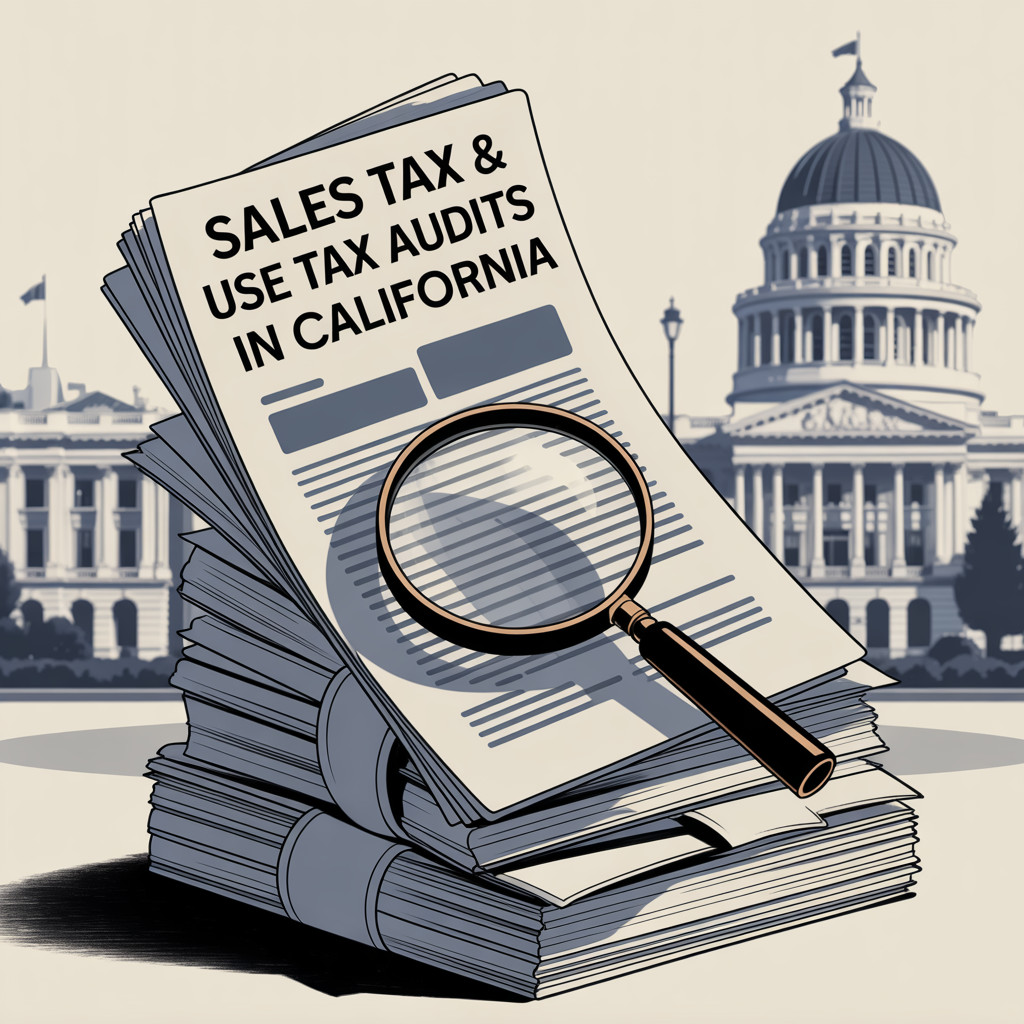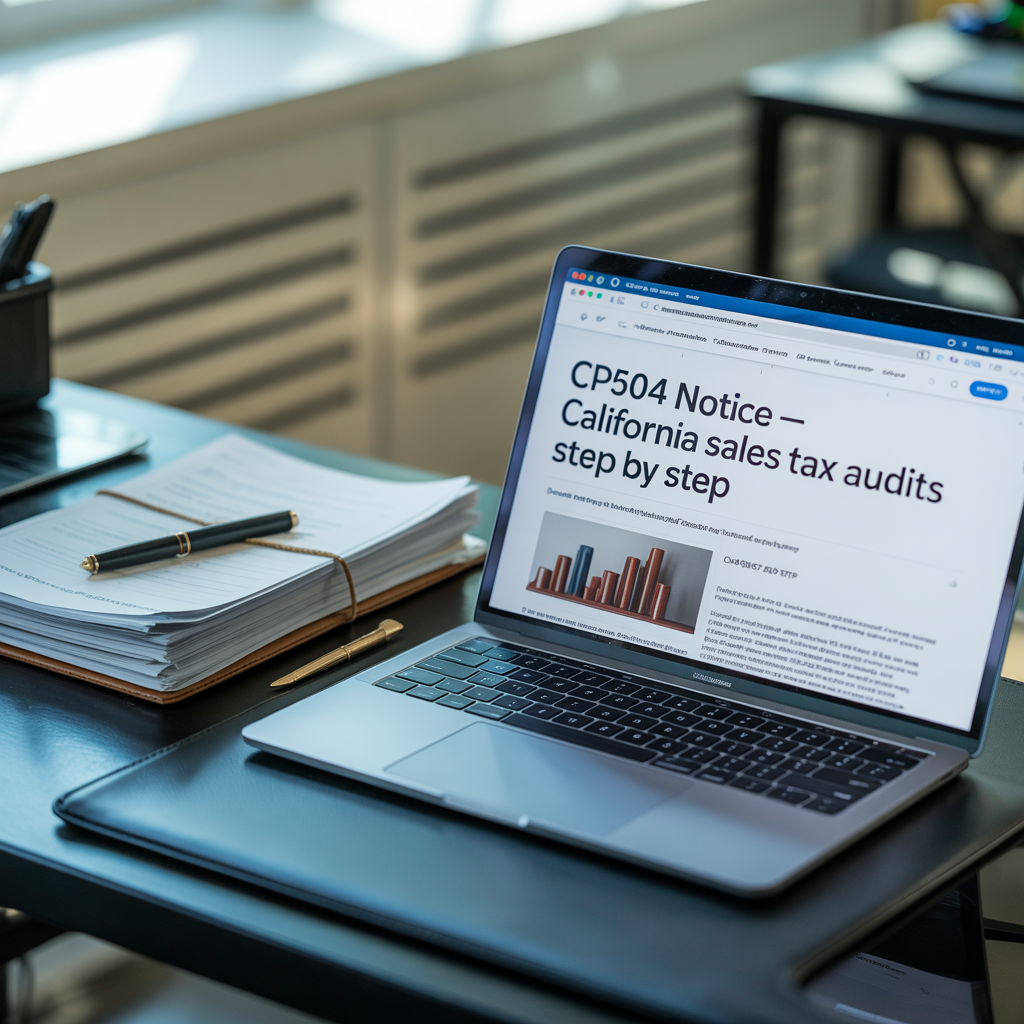Sales Tax and Use Tax Audits in California: What Business Owners Need to Know

Introduction: A Sales Tax Audit in California Is No Joke
If you run a business in California that collects or remits sales tax, you may someday face a knock from the California Department of Tax and Fee Administration (CDTFA) — and it often doesn’t come with much warning.
Whether you’re a retailer, contractor, service provider, or e-commerce seller, a sales or use tax audit can expose your business to massive back assessments, penalties, and long-term consequences if not handled properly.
In this guide, we’ll walk you through exactly how California sales and use tax audits work, what triggers them, and what Orange County business owners can do to protect themselves — and how to get representation for California CDTFA sales and use tax audits before it’s too late.
🔗If you’d rather see these concepts explained step by step, I recorded a short video that walks you through the CDTFA sales and use tax audit process. Watch the full video here ›
📚 What Are Sales and Use Taxes in California?
✅ Sales Tax:
Charged on tangible personal property sold at retail in California. Collected by the seller, remitted to the CDTFA.
✅ Use Tax:
Applies to out-of-state purchases used, stored, or consumed in California when sales tax wasn’t paid at the time of sale (e.g., online purchases, equipment, contractor tools).
🧠 What Is a CDTFA Audit?
A CDTFA audit is an in-depth review of your business’s books, records, and tax filings to determine if you’ve:
- Underreported taxable sales
- Over-claimed exempt sales
- Failed to self-report use tax
- Failed to remit collected tax to the state
It’s also your chance to see the strategies CDTFA auditors use during reviews so you know what to expect and how to respond effectively.
🔍 What Triggers a Sales Tax Audit in California?
| Trigger | Description |
|---|---|
| Late or missing filings | Missed sales tax returns (Form CDTFA-401-A) |
| Large exempt sales | Claiming high volume of non-taxable sales without documentation |
| Mismatch with income tax filings | Gross sales on sales tax return don’t match what’s on your FTB or IRS returns |
| Industry audit sweep | CDTFA routinely audits businesses in high-risk sectors |
| Tips from former employees or customers | Anonymous reports trigger a surprising number of audits |
| Prior noncompliance | Once audited, you’re more likely to be audited again |
⚠️ High-Risk Industries in California
The CDTFA frequently audits businesses in:
- Restaurants and food service
- Construction and contractors
- Auto repair and dealerships
- Retail and convenience stores
- Medical equipment sales
- Cannabis dispensaries
- E-commerce businesses with mixed-taxable inventory
✅ How to Prepare for a Sales or Use Tax Audit
✅ 1. Gather All Sales and Purchase Records
You’ll need:
- Invoices and receipts
- POS summaries and Z-tapes
- Bank statements and credit card reports
- Purchase orders and vendor statements
- Sales tax return copies (CDTFA-401-A)
✅ 2. Identify and Support Exempt Sales
The most common issue in sales tax audits is unsupported exemptions.
Make sure you have:
- Resale certificates (BOE-230)
- Out-of-state shipping records
- Documentation for labor-only charges
✅ 3. Review Use Tax Compliance
If you purchased items from out of state or online:
- Did you pay use tax voluntarily?
- Did you report it on your sales tax return?
The CDTFA often assesses use tax on equipment or goods brought into California from vendors who didn’t charge tax.
✅ 4. Avoid Red Flags in Recordkeeping
Auditors don’t like:
- Rounded numbers with no documentation
- Inconsistent reporting across sales tax, income tax, and bank deposits
- Commingled funds or poor sales breakdowns
🛑 What Happens If You Fail a Sales Tax Audit?
Failing a sales tax audit can mean much more than just paying the balance due. You must understand the consequences of an unfavorable audit result, which may include:
- Back assessments for unreported taxable sales
- 25% penalty for negligence
- 10% penalty for late payment
- Daily compounded interest
- Referral to the FTB for collection if unpaid
👉 What the FTB Can and Can’t Legally Seize
🧾 What to Do If You Disagree with the Audit Results
You have the right to:
- learn how to challenge audit assessments through proper documentation and legal arguments
- navigate the CDTFA appeal process with professional guidance
- Request a redetermination
- Request a redetermination
- Appeal to the CDTFA Office of Tax Appeals (OTA)
- File a claim for refund, if overpaid
Timing is critical — most appeals must be filed within 30 days of the notice.
🧭 How Boulanger CPA Helps Orange County Businesses
We help retailers, contractors, service providers, and e-commerce sellers across Irvine, Anaheim, Santa Ana, Fullerton, and beyond:
- Prepare for CDTFA audits
- Respond to audit notices and document requests
- Defend against unreasonable assessments
- Request audit reconsideration or appeal
- Prevent FTB collections from CDTFA referrals
📞 Call
657-218-5700
🌐
www.orangecounty.cpa
Frequently Asked Questions
What is the difference between sales tax and use tax in California?
Sales tax is collected on taxable retail sales in California, while use tax applies to taxable purchases from out-of-state sellers where no sales tax was charged.
What triggers a sales or use tax audit?
Common triggers include discrepancies between reported sales and third-party data, industry audit trends, and prior compliance issues.
Who conducts sales and use tax audits in California?
The California Department of Tax and Fee Administration (CDTFA) conducts these audits to verify tax compliance.
How long does a CDTFA audit take?
The length of an audit varies but can range from several weeks to over a year depending on the complexity of your business and the audit scope.
Can I appeal the results of a CDTFA audit?
Yes. You can dispute findings through an appeal process that may include a hearing before the Office of Tax Appeals.
How can a CPA help with a sales or use tax audit?
A CPA can review records, prepare documentation, communicate with the CDTFA, and represent your business to protect your financial interests.
📣 About the Author
Marc Boulanger, CPA is the founder of Boulanger CPA and Consulting PC, based in Orange County, California.
With over a decade of experience helping individuals and businesses resolve serious IRS and State tax issues, Marc specializes in tax resolution strategies including Offers in Compromise, wage garnishment relief, and back tax compliance.
He is licensed as a Certified Public Accountant in both California and Oklahoma, and has a proven track record of helping clients settle complex tax debts and regain financial stability.
📍 Learn more at www.orangecounty.cpa or call (657) 218-5700.










